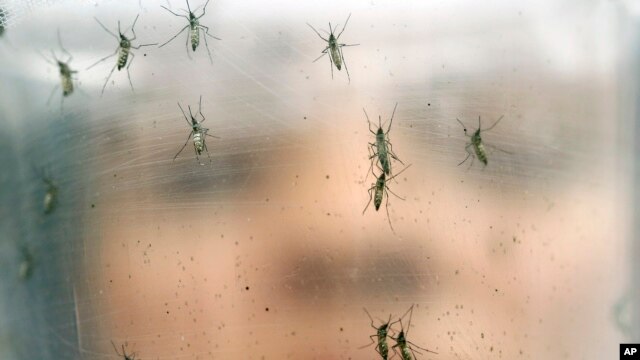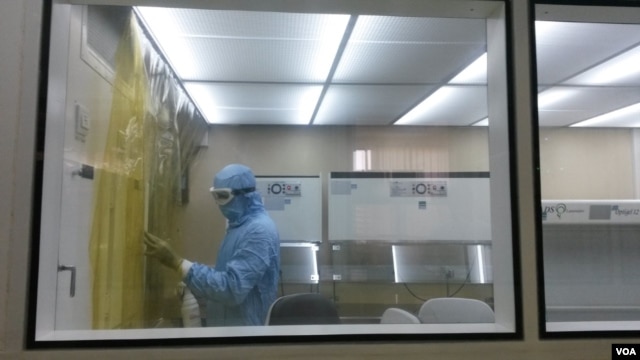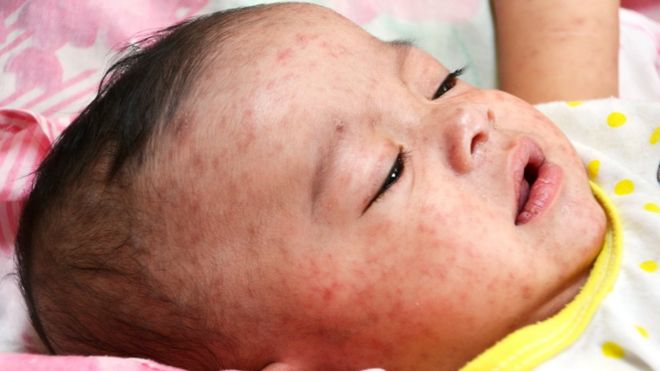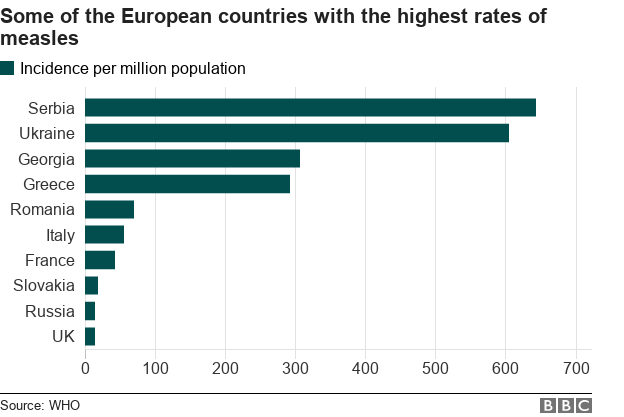How can this happen? We are no longer in the Middle Ages. This is the Twenty-First Century where scientists have found vaccines and cures for this. Read more @ UN: More than 400 dead in southeast Congo measles outbreak
Navigation
Install the app
How to install the app on iOS
Follow along with the video below to see how to install our site as a web app on your home screen.

Note: This feature currently requires accessing the site using the built-in Safari browser.
More options
You are using an out of date browser. It may not display this or other websites correctly.
You should upgrade or use an alternative browser.
You should upgrade or use an alternative browser.
UN: More than 400 dead in southeast Congo measles outbreak
- Thread starter longknife
- Start date
Yellow fever epidemic in the Congo...

Congo Declares Yellow Fever Epidemic
June 20, 2016 — Three provinces affected, including capital Kinshasa, after health officials confirm 67 cases of the disease, with another 1,000 suspected cases being monitored
Congo Declares Yellow Fever Epidemic
June 20, 2016 — Three provinces affected, including capital Kinshasa, after health officials confirm 67 cases of the disease, with another 1,000 suspected cases being monitored
Democratic Republic of Congo on Monday declared a yellow fever epidemic in three provinces, including the capital Kinshasa, after confirming 67 cases of the disease, with another 1,000 suspected cases being monitored. Health Minister Felix Kabange said only seven of the proven cases were indigenous to the Central African country, while 58 were imported from Angola, where the outbreak began. A further two cases came from remote forested areas not linked to the current outbreak. Five people in total have died, Kabange added. "I declare today a localized epidemic of yellow fever in the provinces of Kinshasa, Kongo Central and Kwango," Kabange told a news conference. Kinshasa is the primary concern for global health officials since it has a densely-packed population of more than 12 million and poor healthcare infrastructure.

A researcher holds a container of female Aedes aegypti mosquitoes at the Biomedical Sciences Institute at Sao Paulo University in Brazil
Yellow fever is transmitted by the same mosquitoes that spread the Zika and dengue viruses, although it is a much more serious disease. The "yellow" in the name refers to the jaundice that affects some infected patients. The global stockpile of vaccines has already been depleted twice this year to immunize people in Angola, Uganda and Congo. It stands at 6 million doses, but this may not be enough if there are simultaneous outbreaks in multiple highly-populated areas, experts warn. Almost 18 million doses have been distributed for emergency vaccination campaigns so far in the three African countries. The current method for making vaccines, using chicken eggs, takes a year.
World Health Organization (WHO) advisers have recommended using a fifth of the standard dose of vaccine in the event of a global shortage - enough to immunize temporarily but not to give lifelong immunity. "An epidemic in such a large city [as Kinshasa] is always difficult to handle," said WHO's Congo representative Yokouide Allarangar. A vaccination campaign has been staged in two of the city's health zones deemed as high risk because the virus is circulating but is not linked to imported cases, he said. "We need to quickly try to contain these zones where the virus circulates to prevent the disease from spreading to other zones," he said, adding that a million of the city's residents have been vaccinated so far.

A technician at the Institut Pasteur in Dakar, Senegal, sterilizes one of the labs where the yellow fever vaccine is made.
Manufacturers of the vaccine include the Institut Pasteur, government factories in Brazil and Russia as well as French drugmaker Sanofi. Congo's outbreak, since January, comes at a time when political tensions linked to an upcoming presidential election and an economic crisis stoked by a slump in global commodity prices is already putting a huge strain on the country's stability. President Joseph Kabila is facing opposition, which has sometimes turned violent, amid concerns that he will try to cling to power beyond the expiry of his mandate at year-end.
Congo Declares Yellow Fever Epidemic
Congo vaccinating a million people over the next ten days for yellow fever...

Democratic Republic of Congo launches yellow fever vaccination drive
July 20, 2016 - Democratic Republic of Congo launched a campaign on Wednesday to vaccinate about a million people against yellow fever over the next 10 days in the capital Kinshasa and a nearby province.
Democratic Republic of Congo launches yellow fever vaccination drive
July 20, 2016 - Democratic Republic of Congo launched a campaign on Wednesday to vaccinate about a million people against yellow fever over the next 10 days in the capital Kinshasa and a nearby province.
A wider campaign to vaccinate more than 10 million people in the city and along the border with Angola will have to wait at least two more weeks, however, due to shortages of vaccine and syringes. "Now I am armored. Now I have the blood of a soldier," said Claudy Pindi, who is in his forties, holding up his yellow vaccination card. Pindi was among the first to be vaccinated in Kinshasa's Kisenso district, where four people are suspected of having died from yellow fever. Congo's health minister declared a yellow fever epidemic last month after the hemorrhagic virus spread from Angola, where 350 people have died since last December in the worst outbreak in decades. Congo had registered 1,798 suspected cases of yellow fever as of July 11, according to the World Health Organization (WHO), including 85 deaths believed caused by the disease.
Only 68 cases have been laboratory confirmed however, due to a technical problem over the last three weeks that hindered the shipping of a chemical used in testing. Over 100 people queued to be vaccinated on Wednesday under tents set up by health workers on a soccer pitch in Kisenso. Authorities have identified around 80 suspected cases of yellow fever there. Residents of three health zones in Kwango province, which abuts the Angolan border, will also be vaccinated during the campaign. "We are very sure we will stop the spread of the virus," said Gedeon Siama, supervising nurse for the Kisenso health zone. "At the community level, the monitoring is very active."
The vaccination drive is the second this year after more than two million people were vaccinated in Kinshasa and Kongo Central province in late May. Health officials have also expressed concerns about beginning with such a targeted approach in Kinshasa, a chaotic megacity of some 12 million people. During the last vaccination drive in May, people arrived from outside targeted areas, preventing some local residents from being vaccinated and provoking violence outside some health centers.
Eugene Kabambi, a WHO spokesman in Kinshasa, said authorities were using community leaders and street campaigners with megaphones to promote the current drive. "We've avoided a strong publicity campaign. We've focused on word of mouth communication," he said. The yellow fever vaccine takes one year to manufacture and there currently exist just 8 million doses in the world after stocks were depleted in series of outbreaks earlier this year. Congo expects to begin receiving more vaccine next month from a laboratory in Brazil and health officials will administer only partial doses in some areas to provide immunity of up to a year in order to most effectively use limited stocks.
Democratic Republic of Congo launches yellow fever vaccination drive
Deadly measles outbreak in Romania...

Measles outbreak in Romania causes 17 deaths
Mar 10,`17 -- Thousands of people have caught measles in an ongoing outbreak that has caused 17 deaths in Romania, the health minister said Friday.

Measles outbreak in Romania causes 17 deaths
Mar 10,`17 -- Thousands of people have caught measles in an ongoing outbreak that has caused 17 deaths in Romania, the health minister said Friday.
Florian Bodog said that around 3,400 people had contracted the disease since the outbreak began in September 2016. He said the virus was similar to strains found in Hungary or Italy, but couldn't say whether it was the same one.
Romania has lowered the age for administering the first vaccine dose from the usual 12 months to nine months, recommending all children under 9 are vaccinated. The European Center for Disease Prevention and Control warned this week that "the likelihood of exportation of measles (from Romania) cases is high."
Most cases have been registered in western and southwestern Romania. In neighboring Hungary, there was no threat of a national epidemic after Hungarian health officials reported 31 suspected cases of measles, said Beatrix Oroszi, head of the National Center for Epidemiology.
News from The Associated Press
Measles cases hit record high in Europe...

Measles cases hit record high in Europe
20 Aug.`18 - Cases of measles in Europe have hit a record high, according to the World Health Organization (WHO). More than 41,000 people have been infected in the first six months of 2018, leading to 37 deaths.

Measles cases hit record high in Europe
20 Aug.`18 - Cases of measles in Europe have hit a record high, according to the World Health Organization (WHO). More than 41,000 people have been infected in the first six months of 2018, leading to 37 deaths.
Last year there were 23,927 cases and the year before 5,273. Experts blame this surge in infections on a drop in the number of people being vaccinated. In England, there have been 807 cases so far this year. The WHO is calling on European countries to take action. Public Health England say the outbreaks in England are largely due to people who have travelled to areas of mainland Europe that have had outbreaks. Measles is highly infectious and spreads by droplets in coughs and sneezes.

Measles is a highly infectious viral illness that can be deadly
The infection lasts seven to 10 days. But while most people recover completely, it can cause some serious complications, including:
The MMR vaccine can prevent infection but discredited research 20 years ago that erroneously linked MMR to autism has stopped some people from trusting the vaccine. The NHS recommends all children receive the MMR around their first birthday and then just before starting school. Ukraine and Serbia are among the countries with the highest rates in Europe.
- encephalitis (infection and swelling of the brain)
- meningitis
- febrile convulsions
- pneumonia
- liver infection (hepatitis)

Dr Nedret Emiroglu, from the WHO, said: "This partial setback demonstrates that every under-immunised person remains vulnerable no matter where they live and every country must keep pushing to increase coverage and close immunity gaps." Italy's upper house of parliament recently voted through legislation to abolish the law that makes vaccination mandatory for children before they start school. The amendment will mean parents of unvaccinated children will no longer face fines.
Measles symptoms:
Similar threads
- Replies
- 87
- Views
- 845
- Replies
- 24
- Views
- 698
- Replies
- 17
- Views
- 306
- Replies
- 18
- Views
- 378
Latest Discussions
- Replies
- 131
- Views
- 672
- Replies
- 53
- Views
- 343
Forum List
-
-
-
-
-
Political Satire 8080
-
-
-
-
-
-
-
-
-
-
-
-
-
-
-
-
-
-
-
ObamaCare 781
-
-
-
-
-
-
-
-
-
-
-
Member Usernotes 471
-
-
-
-
-
-
-
-
-
-
